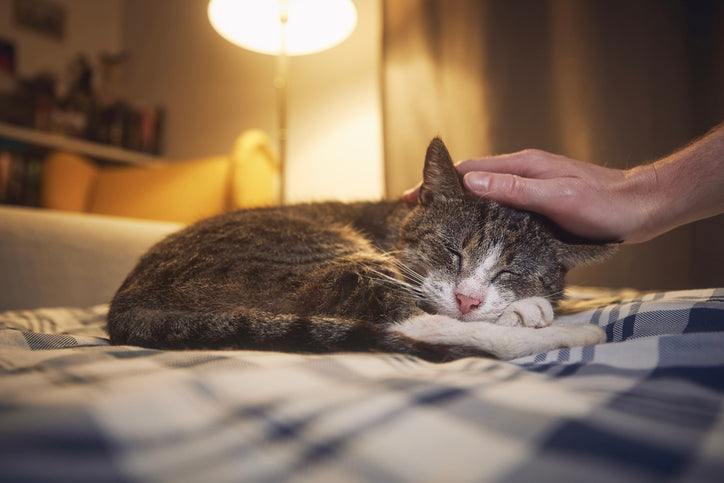
Understanding Senior Cat Nutrition: A Complete Guide for Pet Parents in India
|
|
Time to read 3 min
|
|
Time to read 3 min
As our cats age, their bodies — like ours — begin to slow down. Metabolism decreases, kidney and joint health become more delicate, and nutrient absorption weakens. While pet parents often focus on finding the best cat food for kittens, senior cats deserve the same care — if not more.
This comprehensive guide by NativFarm helps you understand your older cat’s changing needs, the science behind feline aging, and how to choose the most healthy cat food in India for senior cats.
Cats typically enter their senior years around age 7, with visible aging signs becoming clearer after 10. Indoor cats tend to live longer — often beyond 15 years — while outdoor cats may show signs of aging sooner due to exposure and stress.
Common aging signs include:
Sleeping more and moving less
Stiffness after naps or reduced jumping
Changes in appetite or thirst
Subtle weight fluctuations
| Nutrient | Kittens Need | Senior Cats Need |
|---|---|---|
| Protein | High for growth | Moderate, kidney-friendly protein |
| Fat | High for energy | Controlled fat to prevent obesity |
| Calories | Dense | Moderate to low |
| Hydration | Less focus | Crucial for kidney health |
| Vitamins & Minerals | Bone growth | Joint & organ support |
Key takeaway:
While kittens need calorie-dense diets, older cats thrive on lean, balanced meals rich in hydration and controlled protein.
As cats age, their metabolism slows and organ efficiency decreases.
The three biggest dietary considerations for senior cats are:
Metabolism Decline → fewer calories needed
Reduced Kidney Function → lower phosphorus and sodium
Muscle Loss → maintain with digestible, animal-based proteins
A tailored diet slows aging effects, keeps cats mobile, and enhances lifespan.
Cats are obligate carnivores — they need animal protein to survive. However, excessive protein can stress aging kidneys.
Ideal Protein Sources:
Chicken, Tuna, Salmon, Lamb, Egg Whites
Avoid:
Low-grade “meat by-products”
High-salt or soy-based foods
Look for labels where protein is the first ingredient — not grains or fillers.
Older cats often lose their natural thirst drive, leading to dehydration and urinary issues.
Tips for Hydration:
Prioritize wet cat food or mix it with dry kibble (70:30 ratio).
Place multiple water bowls in quiet corners.
Use pet fountains — cats love running water.
Add broth toppers or rehydrated freeze-dried food.
Kidney-protective nutrients:
Omega-3 fatty acids
Reduced phosphorus
Controlled sodium
Vitamin E, C, and antioxidants
Arthritis and stiffness are common in older cats. Joint supplements can ease mobility issues.
Key nutrients:
Glucosamine & Chondroitin – for cartilage repair
Omega-3 Fatty Acids – anti-inflammatory
Calcium & Vitamin D – bone strength
Aging cats can experience cognitive decline (feline dementia). Proper nutrients help maintain mental alertness and vision.
Essential brain nutrients:
DHA (from fish oil)
Taurine (for vision and heart)
Antioxidants (Vitamin E, Selenium)
Senior cats face either weight gain (low activity) or weight loss (poor absorption).
For overweight cats:
Feed calorie-controlled food
Encourage light daily play
For underweight cats:
Use high-protein wet food
Warm meals slightly for aroma
Check for dental or thyroid issues
Digestive support:
Add fiber (pumpkin, beet pulp) and probiotics to maintain gut health.
When shopping for senior cat food, prioritize natural ingredients and transparency.
Farmina N&D Senior – Grain-free, high protein
Royal Canin Ageing 12+ – Kidney & heart support
Whiskas 7+ Wet Pouches – Hydrating and palatable
Me-O Tuna Jelly – Balanced and affordable
NativFarm (Coming Soon) – Clean, natural Indian-origin ingredients
Tip: Mix wet and dry foods (70% wet, 30% dry) for balanced nutrition.
Feed 3–4 small meals daily instead of 1–2 large ones
Keep a consistent routine
Always ensure fresh water access
Avoid bones or raw food
| Supplement | Benefit | Use Caution |
|---|---|---|
| Fish Oil | Kidney & joint support | Too much = diarrhea |
| Glucosamine | Joint health | Check dosage |
| Probiotics | Digestion | Avoid human types |
| Taurine | Vision & heart | Safe in moderate doses |
| Condition | Dietary Focus |
|---|---|
| CKD | Low-phosphorus, moderate protein, high moisture |
| Diabetes | High protein, low carbs |
| Thyroid | Controlled iodine, balanced calories |
Nutrition aside, senior cats need emotional stability and affection.
Keep their space cozy, quiet, and accessible
Provide soft bedding & easy litter access
Spend time daily — brushing, talking, playing gently
Just as you once cared for your kitten’s growth, your senior cat now needs your help to age gracefully.
By choosing vet-recommended, balanced, and kidney-friendly food, along with love and attention, your cat can enjoy its golden years with vitality and purrs.